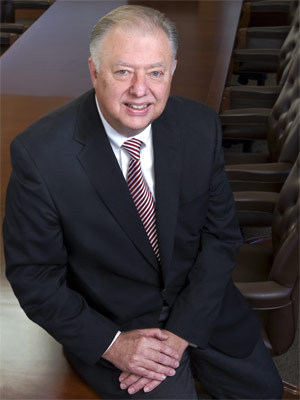Efforts to repair the state’s failing pension system should not punish those who have faithfully paid into that system, NIU President John Peters said today in his keynote address at the State University Annuitants Association annual meeting in Springfield.
“It is unfair to lay this problem at the feet of employees and annuitants. In the history of the Illinois pension system, they have never failed to pay their share on time,” Peters told the assembled retirees. “The answer to the state’s pension problems should not result in diminished benefits – for you, or for our current employees.”
The issue is of particular importance to state university employees as the SURS pension system replaces Social Security. Participants have no other retirement “safety net” in the event the state fails to meet its obligation.
Peters noted that the $82 million unfunded liability in the state’s pension funds (the largest such shortfall in the nation) is the result of the state legislature repeatedly choosing to defer its constitutionally required contributions. That situation could have been avoided, Peters speculated, but for a fateful decision 50 years ago to move responsibility for funding the nominal cost of the university pension system from the universities to the state.”
“Had they not made that change, I maintain that there would be no unfunded liability and we would not be discussing this issue today,” he said.
Worrying about mistakes of the past, however, will not solve current problems, said Peters, who vowed that he and his fellow university presidents and chancellors will be at the table this fall to hammer out a solution that is fair to all.
“Leaders in public higher education in Illinois must suggest viable alternatives that will address the very real financial distress confronting our pension systems,” he said. “We can argue about root cause, but the problem remains, and it is essential that higher education leaders put forth plans and options to resolve this crisis.”
Those negotiations are likely to be among the most important ever for state employees, Peters said, noting that the decisions made will have consequences for years to come. He called upon the SUAA membership to remain vocal throughout that process. He described annuitants as the “boots on the ground” that helped prevent potentially hasty and damaging decisions during the recently concluded legislative session.
“We will need you again this fall,” he said. “I am certain that these issues will once again take center stage during the veto session and we simply must get it right this time. We cannot afford to fail.”
Efforts to salvage the pension system by increasing the burden on state university employees and retirees is a symptom of a larger problem, Peters said. It is an example of how the social contract between the state and higher education has been strained to the breaking point in recent years.
America is reducing its support for higher education while foreign countries are spending more, putting America at a disadvantage in the global marketplace, he said.
“For more than 150 years we as a nation defined higher education as a public good,” Peters said. “Today, it is cast as a private benefit instead of the best possible investment in the future of the people of this state and our nation.”

